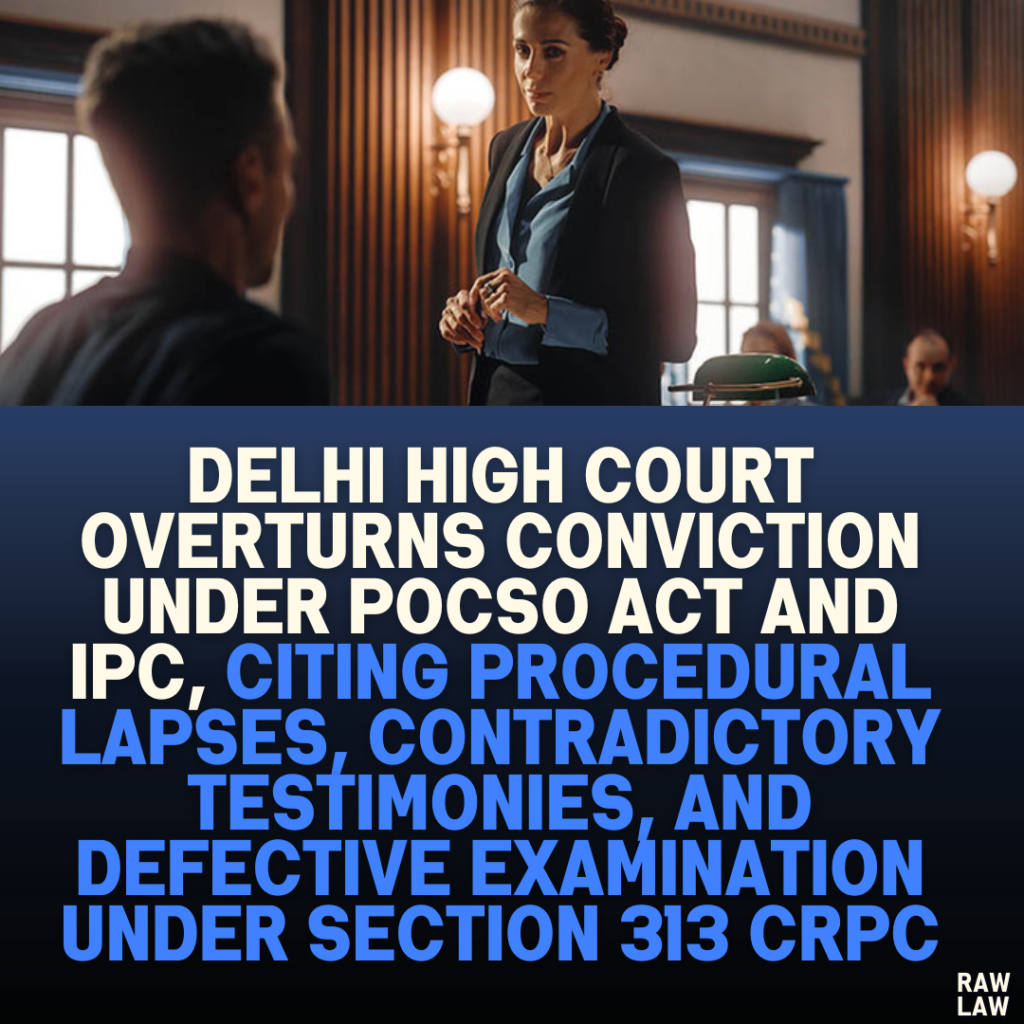1. Court’s Decision
The Delhi High Court overturned the conviction of the appellant, originally sentenced under Sections 10 and 12 of the Protection of Children from Sexual Offences (POCSO) Act, along with Sections 354, 354A, 354D, 363/366, and 511 of the Indian Penal Code (IPC). The court concluded that significant procedural lapses, inconsistencies in witness testimonies, and improper examination under Section 313 of the CrPC prejudiced the accused. Consequently, the judgment and sentence of the trial court were set aside, and the appellant was acquitted.
2. Facts
- Incident: The case arose when the appellant was accused of harassing a 12-year-old schoolgirl (the victim) over several days, attempting to drag her towards a market (Som Bazar) on the day of the incident. Passers-by, along with the victim’s father and uncle, intervened and detained the appellant.
- Police Investigation: After receiving a call, police filed an FIR and conducted an investigation. A chargesheet was submitted, framing charges under relevant IPC and POCSO provisions.
- Charges: The appellant was charged with kidnapping, molestation, and other offenses.
3. Issues
- Were the procedural safeguards during the trial upheld?
- Did inconsistencies in the victim’s testimony and failure to cross-examine key witnesses undermine the prosecution’s case?
- Was the appellant’s right to a fair trial violated due to improper examination under Section 313 of the CrPC?
4. Petitioner’s Arguments
- Contradictions in Testimonies: The appellant argued that the victim’s statement under Section 164 CrPC contradicted her earlier allegations. She did not mention molestation or kidnapping in her statement, which weakened the case.
- Inconsistencies in Prosecution’s Case: Prosecution witnesses, including the victim (PW-1), provided inconsistent and unreliable statements at different stages of the trial.
- Failure to Identify the Appellant: An eyewitness (PW-2) failed to identify the appellant and was not cross-examined, leaving doubts about the case.
- Improper Trial Process: The defense claimed procedural lapses, particularly the improper examination of the appellant under Section 313 CrPC, which deprived him of a fair opportunity to explain incriminating evidence.
- Prejudice: The absence of legal counsel during key testimonies and the lack of independent witnesses further prejudiced the trial.
5. Respondent’s Arguments
- Seriousness of the Allegations: The prosecution emphasized the gravity of the offense, arguing that the evidence presented was sufficient to sustain the conviction.
- Reliability of Victim’s Testimony: Despite procedural lapses, the prosecution asserted that the victim’s statements and circumstantial evidence supported the trial court’s findings.
6. Analysis of the Law
- Procedural Lapses:
- Cross-Examination of Witnesses: Key witnesses, including the victim (PW-1), were not cross-examined, violating the principles of natural justice.
- Inconsistencies in Victim’s Statement: The victim’s Section 164 CrPC statement did not include allegations of molestation or kidnapping, casting doubt on the prosecution’s case.
- Improper Examination Under Section 313 CrPC: The court noted that incriminating evidence was not adequately presented to the appellant, denying him an opportunity to explain or rebut the allegations effectively.
- Quality of Evidence: The court emphasized that while a victim’s testimony can be relied upon without corroboration in serious offenses, it must be of “sterling quality” and free from contradictions. In this case, the inconsistencies rendered the testimony unreliable.
7. Precedent Analysis
- Harendra Rai v. State of Bihar (2023 SCC OnLine SC 1023):
- Section 311 CrPC does not permit reopening a trial but ensures that recalling witnesses is allowed when their testimony is essential for justice.
- Failure to recall and cross-examine witnesses violated the appellant’s right to a fair trial.
- Asraf Ali v. State of Assam (2008) 16 SCC 328:
- Section 313 CrPC is crucial for ensuring a direct dialogue between the accused and the court. The accused must be questioned about all incriminating evidence to provide an opportunity to explain.
8. Court’s Reasoning
The court identified critical procedural and evidentiary issues:
- Failure to Cross-Examine: The victim and key witnesses were not cross-examined, depriving the appellant of the opportunity to challenge their testimonies.
- Contradictory Statements: The victim’s statement under Section 164 CrPC conflicted with her earlier allegations, creating reasonable doubt.
- Defective Section 313 CrPC Examination: The court highlighted that the appellant was not adequately questioned about incriminating evidence, breaching procedural requirements.
The court stated:
“The procedural lapse and contradictions in the victim’s testimony create reasonable doubt regarding the veracity of the allegations.”
“The quality of the prosecutrix’s testimony must be of sterling quality to rely on it without corroboration.”
9. Conclusion
The court allowed the appeal, setting aside the conviction and sentence imposed by the trial court. The appellant was acquitted and directed to be released unless required in another case.
10. Implications
This judgment underscores:
- Fair Trial Standards: Courts must adhere strictly to procedural safeguards to ensure a fair trial, especially in serious offenses under POCSO and IPC.
- Presumption of Innocence: Statutory presumptions under the POCSO Act are not absolute, and the prosecution must prove allegations beyond a reasonable doubt.
- Reliability of Evidence: Inconsistent and uncorroborated testimonies cannot sustain a conviction.
- Procedural Justice: The accused’s rights, including proper examination under Section 313 CrPC and cross-examination of witnesses, are paramount.
The decision may influence future cases by emphasizing the importance of procedural compliance and the reliability of evidence in securing convictions.
